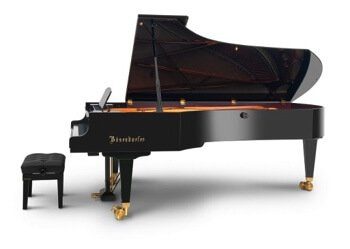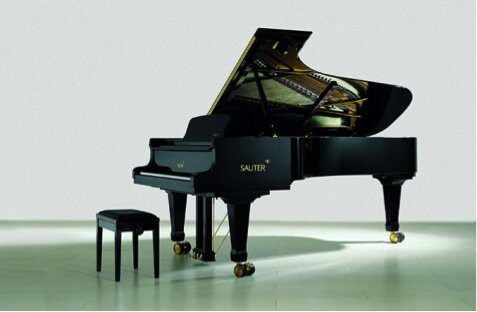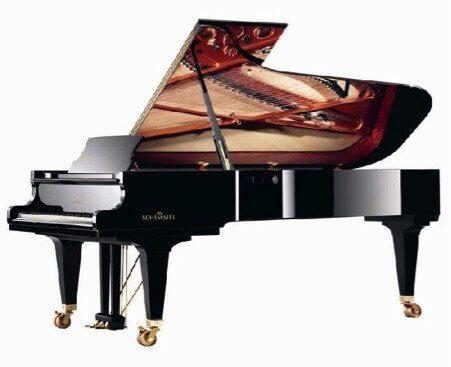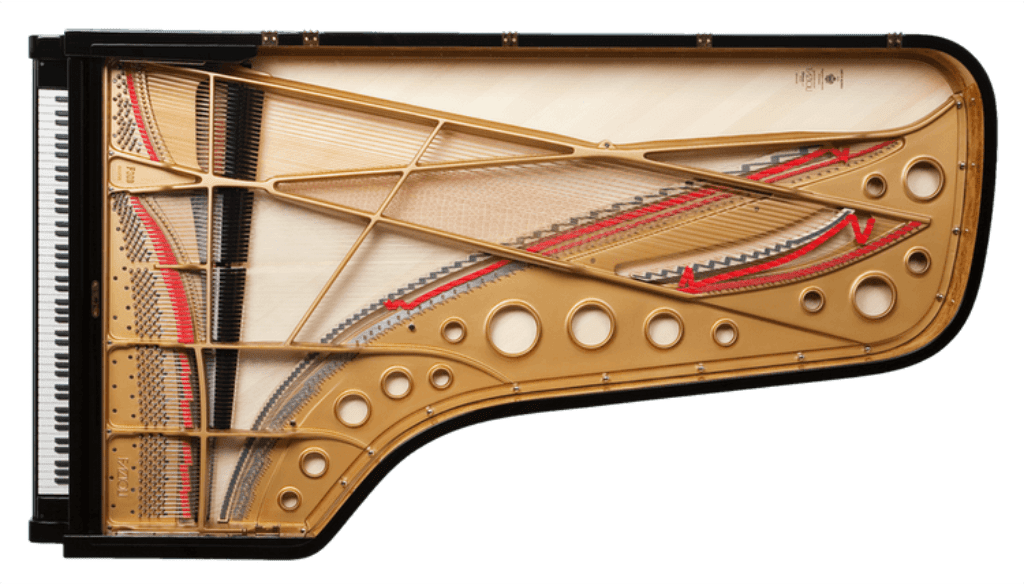Best Concert Grand Pianos
The Concert Grand is considered the epitome of luxurious performance pianos. The most prestigious European manufacturers compete to make their concert grand pianos the ultimate in striking tonal quality and beauty.
The concert piano, by definition, is made to be used on the symphonic stage, grand concert halls and opera houses. But some magnificent private homes with enough space to handle the volume, tone and timbre of such a large instrument do sometimes showcase a concert grand for reasons of interior design or the needs of a professional pianist. But normally the best concert grand pianos are reserved for public venues where their sound is allowed to flourish and resonate as is intended; they are the most magnificent products of the piano craftsmen’s art.

The advantage of a longer acoustic piano is that the strings are also longer, and that is what produces the great power and richness of the concert grands, allowing them to be easily heard clear to the back of a concert hall, even when accompanied by a full symphonic orchestra, all playing at the same time. The workmanship that goes into these instruments gives them the ability to retain harmonic balance, ensuring that close or spread octaves alike have the purity and brilliance to produce virtually beatless perfect fifths. Concert grands excel in these regards, and the technician’s ability to artistically voice an instrument to bring out these elements of tone depends on the excellence of the soundboard wood, the rim stock, and the hammers.
There are many opinions about the extent to which a pianist can affect the tone of a piano while playing, but it is a fact that, with the more sensitive actions of high-quality instruments, the skilled pianist is able to more reliably control the speed of the hammers’ attack on the strings, and thus create a wider tonal palette, giving the audience a better and more nuanced musical experience. This is readily apparent at international piano competitions, at which many pianists, playing the same works on the same piano, can nonetheless bring forth very different tonal qualities from it. The ultimate experience of action control for the artist, possible with only the finest instruments, occurs when the piano becomes a seamless extension of the pianist’s thoughts and feelings — the action seems to disappear, the music seeming to rise effortlessly from the instrument without the presence of an intervening mechanism.
Because concert grands are more musically sensitive than less costly pianos, they may require more frequent servicing if they are to be kept at peak performance levels. But this doesn’t necessarily mean that they’re delicate and finicky. Most of these expensive instruments are built to be taken down, moved long distances, and set up repeatedly; played vigorously for many hours a day; and tuned and serviced regularly. Most owners find, after an initial settling-in period, and a good regulation and tuning, all high-end pianos require only slight touch-up adjustments on a regular basis, and are actually easier to maintain than less costly ones.


Manufacturers of mass-produced, lower-price pianos seldom make concert grands, because concert halls or professional pianists would be unwilling to buy such a piano from a name with the reputation of a budget brand. The companies that make concert grands have a tradition of hand-craftsmanship and many of them have enjoyed top reputations for almost 200 years. Several of the companies have been owned and operated by the same families since they were started in the early 1800’s, and have a very prestigious image in the piano world. Sauter concert grands and Schimmel Konzert grands (their top line) enjoy this renown along with August Forester, Bechstein, and Bluthner, Bosendorfer, Steingraeber, Grotrian and the Steinways coming from Germany (not New York).
In a lesser-grade piano, quality might actually refer to quality-control, making each piano sound as equal as possible to every other. But in the crafting of high-end pianos, quality means something more: Each instrument is judged not on its similarities to its model, but on its musical excellence as a unique instrument. Since the superior natural materials that concert grand pianos are made from are never completely uniform, and because the craftspeople who make these instruments are trained to maximize the musical potential of each instrument, any particular model of a concert grand piano is likely to exhibit small variations in performance characteristics from instrument to instrument. And professionals appreciate these differences and savor them from brand to brand, piano to piano. Our factory trained technicians may also voice (change the tonal characteristics) of a piano in client’s home to better work with acoustics of a room.
Besides the concert grands, there are parlor grands, studio grands, salon grands, and semi-concert grands, depending on their length. Baby grands are those models that are only five feet long or less, front-to-back.
Economy pianos, like the auto industry, can have parts from anywhere, assembled in any of several different countries. However, the great concert grands are all still pure examples of excellent piano-making by skilled craftsmen from original, highly reputable manufacturers, many with a great history stretching back to the most famous composers and performers from centuries ago; Chopin had his Pleyel, Mahler his Blüthner, Brahms his Bösendorfer, and Liszt his Bechstein.
About Euro Pianos Naples
Euro Pianos Naples is a respected distributor of European luxury musical instruments. The company’s origin dates back to 1965. Euro Pianos represents world renowned brands such as Sauter, and it has recently become a manufacturer of its own acrylic instrument – The Aire. Apart from being a successful retailer and entrepreneur organization, Euro Pianos is actively engaged in the artistic and community life of Naples, Florida as an organizer and supporter of musical events throughout the years.

